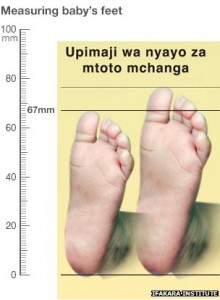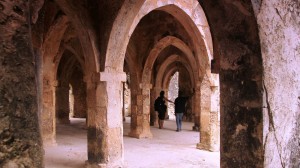by Donovan McGrath
To our readers: If you see an interesting mention of Tanzania in the newspapers and magazines you read, please let us know or send us a copy. Many thanks -Editor.
The poisoned chalice of Tanzania’s land deals
For more than ten years, Tanzania has encouraged foreign investment in land deals with its vision of modernisation and revival of the agricultural sector. 4.5 million hectares is being sought by foreign investors for biofuel or food production, encouraged by the 2009 Kilimo Kwanza (Agriculture First) initiative. However, inadequate land-management legislation has seen few success stories in the selling of land.
Extract: ‘… supposed beneficiaries, such as smallholder Ahmed Kipanga, a 37-year-old father of five from the coastal Kisarawe District, feel short-changed.
“I used to till my land and grow enough food to feed my family,” he told IRIN [UN news agency] in Mbeya, 600km south of a home he no longer has access to, adding that he was also able to earn around US$250 selling his surplus crop for each of the year’s two seasons. I just gave my land because we were convinced by a politician that it would make us rich. I knew I would get money for the land, and also get a well-paying job when the [investment] company began operations, they didn’t do anything and they sold our land to another company we didn’t even know,” he added. Kipanga now has no farm to grow food on and struggles to make ends meet by crushing rocks manually. A 7-tonne truckload brings in around $90, a sum he splits with two friends…
Some 27 agricultural investment deals have been signed since 2008, covering 274,228 hectare, according to data compiled by the Land Matrix. Of these, 11 projects have either been abandoned (including a 34,000 hectare Jatropha plantation in Kilwa District), or have yet to start production more than a year after contracts were signed. Just eight are operational.’ (IRIN UN Humanitarian News Network – 7 November)
Tanzania: the ideal destination for drug gangs
‘Tanzanian authorities battle to curb rise in drug smuggling into and out of the country’
Extract: ‘In his speech on the World Day against Drugs on 26 June, Tanzania’s prime minister Mizengo Pinda lamented that drugs are a national tragedy. According to Pinda, more than 10,799 Tanzanians have been charged with drug-dealing in the past five years. And the minister for foreign affairs and international co-operation, Bernard Membe, conceded last year that Tanzania is one of five countries in the Southern African Development Community implicated in illicit drug trafficking…
Last year more than 103 Tanzanians were arrested for cocaine smuggling in Brazil, and 200 in Hong Kong. A recent report of the Tanzania Drug Control Commission indicates that Tanzania has more than 4,684 registered addicts. The main market for drugs is Kinondoni in Dar es Salaam.
The 2013 report of the United Nations Office for Drugs and Crime (UNODC) indicates that East Africa is a major target for traffickers wishing to enter African markets because of its unprotected coastline, major seaports and airports and porous land borders, which provide multiple entry and exit points. Also attractive to the drug syndicates are inadequate customs controls and cross-border co-operation, as well as weak criminal justice systems… Most ship-borne narcotics are thought to pass through Zanzibar … where they are offloaded and then moved to the mainland in small consignments in boats.’ (Mail Guardian, South Africa – 30 August).
Tanzanian “Beach Boys” in Cape Town
The photojournal describes encounters with a group of up to 100 Tanzanian youths, mainly stowaways, who live rough “under Nelson Mandela Boulevard at the foot of Cape Town, where the high rise buildings end and the docklands begin … [One Tanzanian] …had entered [the UK] through the Port of Hull in 2003 concealed in a Maltese bulk carrier called Global Victory, which he had boarded in the Port of Richard’s Bay on South Africa’s north coast. In his first months in the UK he had lived in Sheffield with a benevolent Cameroonian before bussing to Birmingham, where the Jamaican gangsters around Handsworth had permitted him to hustle small amounts of marijuana. [The mother of his daughter], a second generation Jamaican immigrant, had tried to save him from the streets by convincing her own mother to take him in, but with no other way of making money [he] continued to hustle by day and was eventually done for dealing [and] put on a flight to Dar es Salaam.” (http://africasacountry.com Sept 2013)
Tanzanian ‘mules’ ply Jo’burg streets
‘Tanzania is a transit point for drugs and South Africa is a prominent destination.’ Extract continues: ‘As a Tanzanian, you can’t help but notice the amount of Kiswahili that is spoken in the Jo’burg inner city… Some work as hairdressers or street vendors; others have joined the city’s criminal underworld. A large number are jobless, addicted to drugs and desperate to go home … In July this year, two Tanzanian citizens, Agnes Masogange and Melissa Edward, were arrested at OR Tambo International airport with six bags of tik worth more than TSh7 billion (R42.6-million). According to the South African Revenue Service, this was the largest seizure ever at a South African border… Some Tanzanian mules swallow plastic sachets of drugs and retrieve them later. This can have tragic consequences. Last year, two Tanzanians, Hassan Wanyama and Ali Mpili, died … after the cocaine sachets they had ingested leaked… As a result, all Tanzanians are now coming under suspicion. “At the border, they call us by the name ‘drugs’ and we are searched attentively and differently from others,” a Tanzanian woman said…’ (Mail Guardian, South Africa – 30 August)
During August, September and October 2013, The East African newspaper included a series of articles on music, dance, theatre, poetry and fashion. The following articles have been selected for your interest.
A taste of live music in Dar

Chaba Thomas, Mzungu Kichaa and Jcb Makalla performing at the Triniti club in Dar es Salaam in April. Photo KaLuLeTe
Caroline Uliwa shares her experience of live music in a city restaurant. Extract: ‘It is the must-attend event for lovers of live performance in Dar es Salaam. Held every last Friday of the month at Triniti Restaurant in Oyster Bay, “The Beat” brings together Tanzanian artists performing bongo flava, reggae as well as blends of Afro fusion. The gig, hosted by Caravan Records and director Epsen Olsen aka Mzungu Kichaa [Crazy White Man], was started as a platform for Tanzanian musicians to develop their craft. Anyone who has come into contact with Mzungu Kichaa will tell you that though he’s Danish, he could just as well be born and bred Tanzanian. With his fluency in Kiswahili and command of Maa, he is very much a local musician. The night I attended, Twetulobo Band, consisting of five musicians playing Afro fusion and “Kuchele” traditional music from the Coast, was the first act… Malfred picked up from where Twetulobo left off and played songs from his debut album Hisia Zangu (My Feelings) … Then Mzungu Kichaa took the stage … [and] performed songs from his previous album [and his latest album ] Hustle …’ (East African 3-9 August)
In memory of Shaaban Robert
Extract: ‘Tanzanian writer Shaaban Robert, even in death, has been a role model to many Kiswahili writers and scholars in East Africa. Fifty years after his death, his works continue to influence the Kiswahili language and its writers. To keep his literary star shining, Kiswahili scholars and writers from East Africa and beyond … gathered in the Tanzanian town of Bukoba to celebrate his contribution to Kiswahili literature. Hundreds of visitors from Tanzania, Kenya, Uganda and Ghana attended the conference dubbed Shaaban Robert Week at St Francis Hall.
Prominent Tanzanian scholars Prof Mugyabuso Mulokozi, Dr S. Sewangi, Dr Y. Rubanza, Dr Aldin Mutembei and Felix Sossoo, from the University of Dar es Salaam, attended the meeting and spoke fondly of Shaaban Robert… Mr Sossoo, a Ghanaian who is a master’s student at the University of Dar es Salaam, mesmerised the conference with his presentation on Kufikirika and Kusadikika, two novels by Robert that have been used as setbooks in schools and colleges all over East Africa. Mr Sossoo, who speaks Kiswahili fluently, studied the language at the University of Ghana for his bachelor’s degree. He now teaches at the University of Dar es Salaam… Robert’s son Iqbal Shaaban, who is a businessman, also attended the conference, in which scholars called for the award of a posthumous honorary doctorate to the writer.’ (East African 21-27 September)
Modern dance keeping teens off Dar streets
Contemporary dancer Isaac Abeneko has found a positive way of engaging the youth in Tanzania …’ Extract continues: ‘… Abeneko noticed the soaring numbers [of street children] and went out on a quest to understand why such children stayed away from the classroom… Abeneko came up with a simple solution – art! Local schools did not integrate art into the curriculum through which such children could express themselves, thereby making the learning experience more interesting… The dancer had just arrived from Senegal, where he had been attending a dance workshop with sponsorship from the Vipaji Foundation, a Tanzanian-based organisation that brings artists together to share their skills… Upon his return, he was expected to share his knowledge with local dancers. That was how Abeneko began teaching dance at Dogodogo Centre, an NGO that empowers street children… At a concert … at the Russian Cultural Centre in Dar es Salaam, the teens from Dogodogo Centre were the main act with their Elimu ni dance, choreographed by Abeneko. … the show stopper of the night was the group of six boys … their Elimu ni dance, whose setting was a classroom, had a clear message about the importance of education…’ (East African 12-18 October)
Dance, the modern way
‘Caroline Uliwa was elated to see contemporary dance group Haba na Haba perform in Dar es Salaam …’ Extract continues: ‘… Every year, Haba na Haba holds workshops at which it invites dancers across the country to join renowned choreographers and dancers in learning contemporary dance. It was initiated by Isaac Peter, who later recruited Shaaban Mugado and Malim Masafa to help manage it… Among the pieces that stood out was Maendeleo [Progress], choreographed by Emilie Asla from Norway… The Nyuki [Bees] and Wanawake [Women] sets, with their traditional African dance elements, were equally fascinating… This year, Haba na Haba was sponsored by the Russian Culture Centre, the Vipaji Foundation, Asedeva and the Lumumba Theatre…’ (East African 24-30 August)
Tanzanian model rocks top US fashion show

Flaviana Matata in a Tracy Reese creation at the NY show
‘At the recent Washington DC Fashion Week, in a sea of long hair, black clothes and huge floppy black leather bags, Tanzanian-born model Flaviana [Matata, a 2007 Miss Universe finalist] stood out with a nearly bald head and fitted sleeveless dress’ Extract continues: ‘Michelle Obama did not attend the African-American designer’s Cuban-themed Fashion Week extravaganza. But as [designer Tracy Reese’s] most important fan, the US First Lady’s spirit was evident… at the Studio at Lincoln Centre in Washington DC.’ (East African 14-20 September)
A stain on China’s ties with Africa
Christopher Lee calls on Hong Kong to do more to curb the bloody trade in ivory that is decimating Africa’s elephants – first by not buying it, then by doing more to stop the city becoming a node for traffickers. Extract continues: ‘… The visage of Africa is changing too, as more than a million Chinese guest workers now work and live there… Casting a dark cloud over the relationship is the illegal ivory trade, however, I say “trade”, but it’s not a trade. Really, it is theft; theft and exploitation of Africa’s natural resources.
More than 35,000 African elephants are now poached for their tusks every year. This type of killing cannot be sustained… This is the disheartening side of the China-Africa relationship…… authorities [in Hong Kong] seized on of the biggest hauls of smuggled ivory ever. This means Hong Kong is playing a key role as a transit and consumption hub for illegal ivory…’ (Sunday Morning Post 10 November)- Thanks to Ronald Blanche for this and the next item – Editor
Chinese in court over ivory haul
Extract: ‘Three Chinese nationals have been charged for possessing 706 tusks from poached elephants. Police and wildlife officers have cracked down on suspected poachers amid a surge of killings of elephant and rhino … The three accused – Huang Gin, Xu Fujie and Chen Jinzhan – were arrested … in … Dar es Salaam. They had hidden the tusks, weighing 1.8 tonnes and worth an estimated US$3.1 million in containers… the trio were posing as garlic importers and marine product exporters…’ (South China Morning Post 11 November)
US embassy bombing suspect charged in New York
Extract: ‘The al-Qaeda terrorist suspect charged with orchestrating the bombings of two American embassies in East Africa in 1998 was led in handcuffs into a courtroom in New York … Twelve Americans were among the 224 victims of the twin bombings of the embassies in Kenya and Tanzania…’ (Times 16 October)
Rats sniff out TB
Extract: ‘… in 2000, APOPO [a Belgian NGO researching ways to detect anti-personnel landmines using rats] established a laboratory at Sokoine University of Agriculture in Morogoro, Tanzania that then developed an extensive training ground and test minefield… Since 2008, around 80 Gambian giant pouched rats have [also] been trained to sniff out the killer disease TB. This disease kills almost 1.5m people each year … [WHO] says a single technician, with a microscope, can do 25 samples a day. A rat can sniff out 10 samples in a minute! … rats are so accurate that they can often identify positive samples that have been overlooked by a clinic… The rats have so far diagnosed more than 3,500 cases missed by local clinics… They cost nearly $8,000 to train, but live up to eight years and are cheap to keep…’ (New African)
Dar plan for satellite city
Extract: ‘… In 2008, the government announced its intention to take over 6,400 hectares of land – [later] increased to 50,943 hectares – for construction of a new city, in an effort to decongest Dar es Salaam. But there was uncertainty over compensation of the 750,000 residents … Those affected by the project will be paid Tsh141 million ($89,000) per acre as compensation … government has been breaking the law, given the secrecy surrounding its implementation. Citing the Urban Planning Act, [Kigamboni member of parliament Dr Faustine Ndugulile] said the law requires government to convene a meeting with residents of the area … But the MP says the government made the announcement through newspaper adverts in October 2008 without convening any meetings with the people to be affected…’ (East African 12-18 October)
Reactions after Zanzibar acid attack
Extract: ‘… Like the rest of the dozen or so tour guides … in historic Stone Town, [taxi driver and tour guide] Mr Ola refused to believe that a local resident could have been behind the acid attack … on two 18-year-old British women… “We’re not that stupid,” Mr Ola said, referring to the islanders’ dependence on tourist revenues. Without the sightseers and beachgoers who swarm the island, he said, “at the end of the day we’re going to eat grass.” … “If we knew who it was,” said another, “we would be the first to punish them.”’ (Herald Tribune 4 September) – Thanks to Elsbeth Court for this item
Tanzania Ranks High in Governance Survey
‘The Mo Ibrahim Index of African Governance has ranked Tanzania number 17 out of Africa’s 52 nations in its 2013 survey.’ Extract continues: ‘The indicators include Safety and Rule of Law, Participation and Human Rights, Sustainable Economic Opportunity, and Human Development. Tanzania received 5 percentage points higher than the African average of 51.6%, and ranked third in East Africa (after Seychelles and Rwanda). Tanzania’s biggest improvements have been in Human Development (welfare, education, and health); and it ranked 12th in the continent for Participation and Human Rights…’ (Tanzania Invest 10 October)
100 most influential Africans
Extract: ‘… How do we determine these people’s influence? One yardstick we used was to emphasise that influence is not about popularity … impact on public, social and political discourse, however, is what largely helps us to determine their influence …’ The only Tanzanian in the top 100 is Patrick Ngowi. Extract continues: ‘… [Mr Ngowi is the] 28-year-old CEO of Helvetic Solar Contractors – a Tanzanian company that supplies, installs and maintains solar panel systems throughout the northern circuit of Tanzania… Combining the abundant natural energy that the African sky provides and the high demand for power, this young man has positioned his business to ensure that demand and supply will have a continuous flow. The interesting story is that Ngowi started his business at the age of 15!’ (New African December)




